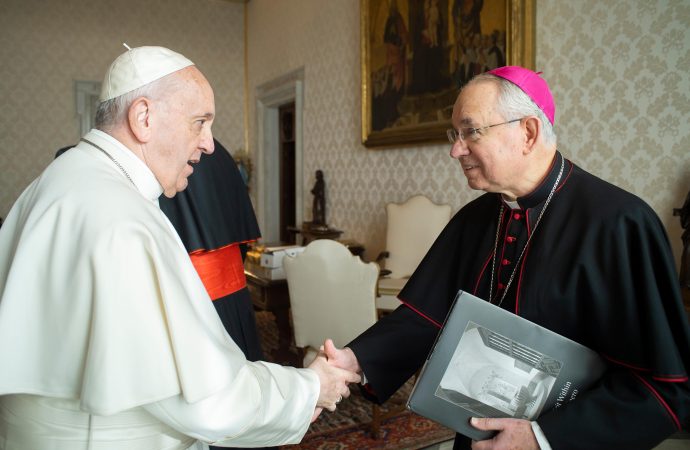
By Inés San Martín
ROME (Crux) – In a video message sent to the annual Religious Education Congress in the Archdiocese of Los Angeles, Pope Francis argued that the “commitment, strength and dedication” of all is needed to build a better tomorrow after a global pandemic that has impacted the lives of all people.
“There is no doubt that we are faced with difficult times,” Pope Francis said. “It is a time of crisis. How fitting is it that the call of the Congress in this context is to ‘Proclaim the Promise!’ We need to proclaim and to remember that we have God’s promise, and that God always keeps his promises.”
“We must also remember that in every woman and man, and in every new generation, is the promise of new relational, intellectual, cultural, and spiritual energies,” he said.
This year marks the 65th anniversary of the L.A. congress, the largest annual gathering of Catholics in North America, and is taking place virtually under the motto of “Proclaim the Promise.”
Pope Francis’s video was shown Thursday, Feb. 19 in the afternoon, together with a similar message from Archbishop José Gomez, who heads the United States’ largest archdiocese.
The prelate thanked those who will be virtually attending the congress for their ministries and service to the Church: “It has been beautiful to see so many of you doing everything you can to bring hope to our people as together we face this pandemic,” Archbishop Gomez said. “Thank you for your creativity, your love for Jesus and your zeal for our brothers and sisters.”
Archbishop Gomez was recently under fire in some circles for a long statement he issued as the president of the United States Bishops’ conference on the day of President Joe Biden’s inauguration.
As the second Catholic commander-in-chief in the history of the United States, the Democrat has many issues the Catholic Church can work closely with him in, including migration, fighting poverty and climate change, but Archbishop Gomez also made clear the policies Biden has pledged in the areas of abortion, contraception, marriage and gender “would advance moral evils and threaten human life and dignity.”
At the time, the perception was that Pope Francis was unhappy with the statement, preferring the less confrontational approach of Cardinal Blase Cupich of Chicago.
RELATED: Analysis — Mixed Messages on Biden Reveal Not Just Competing Camps, But Divided Hearts
In his video message, Pope Francis highlighted the many examples of love given freely and generously during the past months, noting that they have left an indelible mark on the fabric of society, “teaching us how necessary closeness, care and sacrifice is to nourish a universal fraternity. Each one proclaiming and fulfilling God’s promise.”
As he has done before since the beginning of the coronavirus pandemic, the pontiff also highlighted the fact that it is impossible to remain unchanged by a crisis: One comes out of such a watershed moment either better or worse, but never the same.
“In a crisis, one’s own heart is revealed: how solid it is, how merciful, how big, or small,” he said. “In this age, we must recognize the dignity of every human person.”
